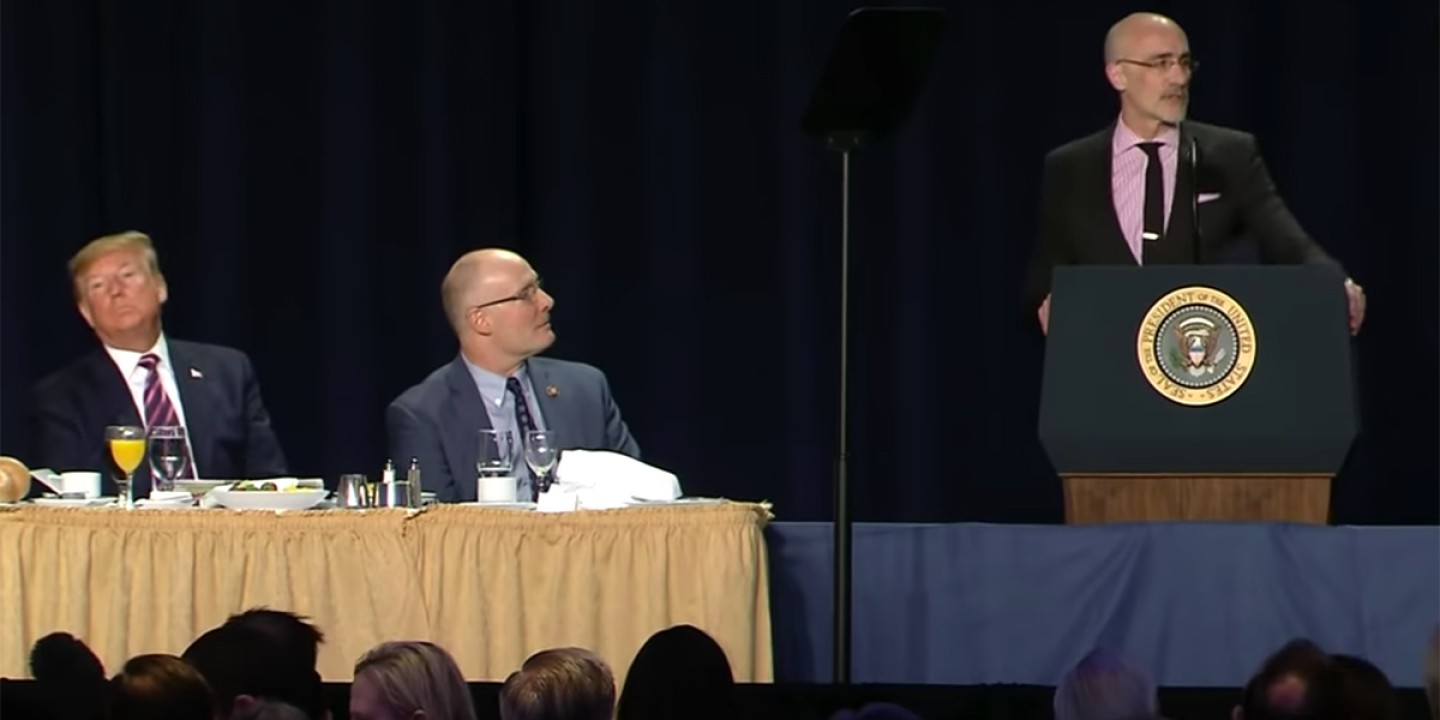Loving your political enemy at the National Prayer Breakfast
Arthur Brooks gave the room an important assignment. President Trump turned it down.

Arthur C. Brooks, former president of the conservative think tank the American Enterprise Institute, may not be trained as a preacher. But his keynote address at last month’s National Prayer Breakfast had all the trimmings of a sermon. Brooks used Jesus’ Sermon on the Mount to speak to the crisis of contempt he believes is fostering deep political polarization and, in his words, is “ripping America apart.” Quoting 19th-century philosopher Arthur Schopenhauer, who said “contempt is the conviction of the utter worthlessness of another human being,” Brooks added, “When you’re treated with contempt, you never forget it.”
In addressing the plague of contempt in American politics, Brooks pointed repeatedly to Jesus. “How do we break the habit of contempt? Some people say we need more civility . . . more tolerance. I say nonsense, because civility and tolerance are a low standard. Jesus didn’t say tolerate your enemies. He said love your enemies. Answer hatred with love.” Brooks then gave a homework assignment to the more than 3,500 people gathered inside the Washington Hilton. “Ask God to give you the strength to do this hard thing: to go against your human nature, to follow Jesus’ teaching. Ask God to take political contempt from your heart. . . . Ask somebody to hold you accountable [for loving your enemies].”
If that wasn’t an altar call in its own right, Brooks asked for a show of hands: “How many of you love somebody with whom you disagree politically?” Most of the audience raised a hand. President Trump, seated two chairs from the podium, did not. In a quick eye survey of the ballroom, Brooks said, to a crowd chuckle, “I’m going to round that off to 100 percent.” Video footage of the event (only available through whitehouse.gov) conveniently shifts from a constant wide-angle pan of the stage to a zoomed-in focus of the podium speaker himself, 30 seconds before the audience hears the question.
The president opened his own remarks by expressing doubt that he could agree with the keynoter’s words. “I don’t know if Arthur’s going to like what I’m going to say,” said Trump, who proceeded to dress down GOP Senator Mitt Romney for his impeachment vote. “I don’t like people who use faith as justification for doing what they know is wrong.” A similarly veiled attack on the faith of House Speaker Nancy Pelosi followed. “Nor do I like people who say, ‘I’ll pray for you,’ when I know that is not so.”
The prayer breakfast is a conservative evangelical event, and it’s expected that presidents will mix politics and faith there. What stunned observers this year, however, was Donald Trump’s brazen disregard of the Christian ethic at the heart of the keynote address, his public denigration of the faith lives of his enemies, and his complete dismissal of a core tenet of Jesus’ teaching. This is a president who struggles with humility, and who by his own assertion has never felt the need to ask God for forgiveness, so we probably shouldn’t expect him to be able to appreciate Brooks’s prayer breakfast plea. Asking God for strength to go against our human nature enough to follow Jesus and love our enemies is indeed a hard thing to do. But since the most difficult faith expressions are often the most important, the assignment remains a critical one for the rest of us, no matter what the president may say or do.
A version of this article appears in the print edition under the title “Giving up contempt.”






